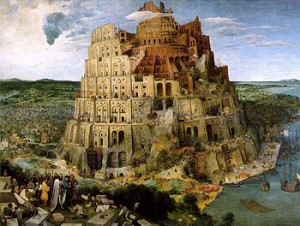- Part of an essay in progress
What is the difference between multilingual and polyglot?
Posted March 1, 2012 3:12 pm Michael Erard, in his book Babel No More, travels the world in search of virtuoso language-learners, among whom are people who “know” 50 languages or more. His book was reviewed in the 1/22/12 NY Times Book Review by Peter Constantine (himself a translator from 9 languages into English) who notes that “true polyglots…find it difficult to say precisely how many languages they speak, since their many languages hover unavoidably at different levels of proficiency.” Ernard defines polyglots as people who essentially collect languages, accumulate them. Apparently doing so requires substantial and consistent hard work. Ernard describes a Berkeley polyglot who hopes to achieve fluency in six languages and who organizes his life around the task, “subjecting himself to an unforgiving schedule, keeping spreadsheets that record the hours and minutes he spend on each.” Even Cardinal Mezzofanti, the historical icon of polyglots who spoke 72 languages, had to work at is, as Erard surmises, when he discovers his flash cards. A review in the Economist concludes that “hyperpolyglots [those with 11 languages or more] may begin with talent, but they aren’t geniuses. They simply enjoy tasks that are drudgery to normal people. The talent and enjoyment drive a virtuous cycle that pushes them to feats others simply shake their heads at, admiration mixed with no small amount of incomprehension.”
Michael Erard, in his book Babel No More, travels the world in search of virtuoso language-learners, among whom are people who “know” 50 languages or more. His book was reviewed in the 1/22/12 NY Times Book Review by Peter Constantine (himself a translator from 9 languages into English) who notes that “true polyglots…find it difficult to say precisely how many languages they speak, since their many languages hover unavoidably at different levels of proficiency.” Ernard defines polyglots as people who essentially collect languages, accumulate them. Apparently doing so requires substantial and consistent hard work. Ernard describes a Berkeley polyglot who hopes to achieve fluency in six languages and who organizes his life around the task, “subjecting himself to an unforgiving schedule, keeping spreadsheets that record the hours and minutes he spend on each.” Even Cardinal Mezzofanti, the historical icon of polyglots who spoke 72 languages, had to work at is, as Erard surmises, when he discovers his flash cards. A review in the Economist concludes that “hyperpolyglots [those with 11 languages or more] may begin with talent, but they aren’t geniuses. They simply enjoy tasks that are drudgery to normal people. The talent and enjoyment drive a virtuous cycle that pushes them to feats others simply shake their heads at, admiration mixed with no small amount of incomprehension.”
For multilinguals, in contract, the goal is communication. In India, Erard interviews people who live in ethnically and linguistically diverse communities and grow up speaking many languages, for whom it is a completely natural thing. This distinction fits my assumption that people who learn multiple languages as children can go on to learn other languages more easily, having laid down or kept open pathways to language learning. Others may acquire multiple languages, but, for most people, it is an effortful and imperfect exercise.
On LinkedIn I have been in discussion with several multilingual people who teach themselves any number of foreign languages. One woman who was raised in a multilinguial environment now masters new languages for the fun of it, and always initially through conversation. She seem unaware of just how remarkable her abilities are.
share
 site feed
site feed
Why bilinguals are smarter
A staff writer for Science, Y. Bhattacharjee, reported in the NY Times (March 18, 2012) on research into the positive effects of juggling two languages. ...



eliz March 23, 2012 at 2:04 pm
Another article discusses the notion that bilingualism makes you smarter: http://nyti.ms/ykFzeI. This article says essentially that the necessity of paying attention to which language is being spoken increases one’s capacity for noticing things, which is essential to learning. Makes sense to me.
eliz March 23, 2012 at 2:01 pm
A very interesting article on a young polyglot in the New York Times: http://nyti.ms/GHYlUQ. The article is followed by comments, many from other polyglots, many from those describing their effort as L2 learning. One particularly interesting line of discussion is the range of definitions of “fluency.” Some argue that an understanding of basic grammar and the memorization of 300 words is sufficient to carrying on a conversation but does not qualify as fluency. This is clearly an issue that deserve considerable discussion.
eliz March 2, 2012 at 7:26 am
How interesting. It had not occurred to me that a the wish for broader communication and a fascination with verbal expression could change into a kind of self-challenge or even acquisitiveness. But why not?
F I MacIllFhinnein March 2, 2012 at 4:39 am
A good insight into what really matters in language learning – attitude. However, I suspect that, as hinted here, the “multilingual” person can more easily become the “polyglot” – the person who takes an interest in languages for their own sake.